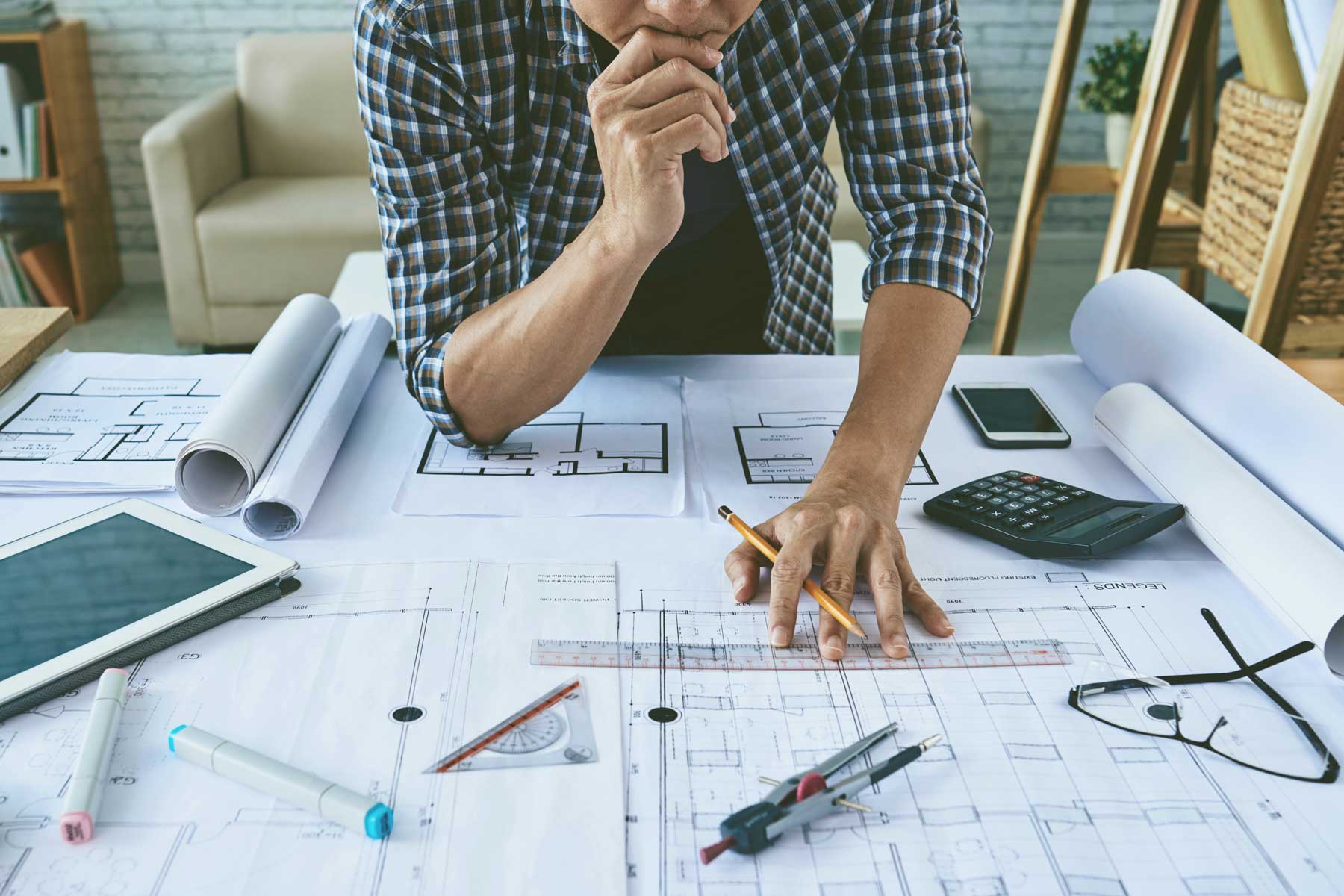Architect Salary Report by Location and Experience
Architect Salary Report by Location and Experience
Blog Article
Discover the Vital Skills and High Qualities Every Architect Should Possess
As a designer, you understand that success in your field exceeds just technical skills. It has to do with mixing creative thinking with usefulness, cultivating cooperation, and taking care of tasks properly. Each top quality plays a crucial duty in your ability to develop rooms that motivate and operate well. What are the certain skills that can genuinely set you apart? Let's discover the important characteristics every Architect must grow to grow in this ever-evolving profession.
Imagination and Advancement
Creative thinking and innovation go to the heart of design, driving the layout of areas that motivate and operate effortlessly. As an architect, you'll require to think outside the box, pushing limits to produce special solutions for your customers. You'll frequently check out new materials, strategies, and innovations to improve your styles. Accepting advancement suggests remaining ahead of fads while being versatile to transform.
You'll additionally attract motivation from numerous sources-- nature, art, and even daily life can trigger fresh concepts. This capacity to mix creativity with usefulness allows you to address intricate problems, ensuring your layouts satisfy both visual and practical needs.
Strong Interaction Abilities
While developing impressive spaces requires creative thinking, solid interaction abilities are simply as vital for designers. You need to convey your concepts clearly to clients, service providers, and staff member. Paying attention is just as vital; recognizing your client's vision aids you produce styles that really meet their needs.
You'll often need to explain complicated principles in a manner that's simple to grasp, whether you're presenting a proposal or reviewing products. Reliable communication cultivates collaboration, ensuring everyone is on the exact same web page throughout the job.
Building connections is crucial, as well. When you establish count on and relationship, customers are most likely to share their problems and responses, bring about much better outcomes.
Last but not least, don't ignore the power of body language and aesthetic help. They can enhance your message and make your presentations more engaging. Solid interaction skills not only raise your layouts however likewise strengthen your expert relationships in the architectural globe.
Technical Effectiveness in Layout Software Program
As you navigate the ever-evolving globe of style, mastering style software program becomes crucial for converting your creative ideas into concrete plans. Acquainting on your own with programs like AutoCAD, Revit, and SketchUp will certainly not just enhance your style capabilities yet additionally streamline your operations. These tools enable you to produce comprehensive illustrations, 3D versions, and even simulations that can assist you envision and offer your concepts better.
Routinely updating your abilities and discovering new functions can set you apart from your peers, guaranteeing your layouts are innovative and precise. Inevitably, technical proficiency in design software application is a cornerstone of effective design, helping you bring your visions to life.
Recognizing of Design Principles

Recognizing engineering principles additionally enables you to anticipate possible challenges early in the layout process. When you know just how different products behave under various problems, you can make informed selections that enhance your layouts. Your layouts should not only be visually pleasing however also useful and sustainable.
Additionally, a strong grasp of design concepts allows you to innovate within restrictions. You can press imaginative boundaries while still adhering to safety requirements. Ultimately, this understanding enhances your architectural practice and establishes you apart in a competitive area.
Job Monitoring Talents
Efficient project management capacities are vital for engineers, allowing you to look after all facets of a task from perception to conclusion. You'll require to collaborate with various stakeholders, consisting of clients, professionals, and engineers, making certain every person's on the exact same web page. Establishing clear objectives, timelines, and budget plans is essential; it aids you keep the project on the right track and within extent.
As an architect, you ought to likewise be proficient in jeopardy administration, identifying potential problems before they escalate. Strong interaction skills are necessary, enabling you to verbalize your vision and inspire your team. You'll take advantage of being organized and detail-oriented, as this aids improve procedures and prevent expensive hold-ups.
Additionally, adaptability is key; jobs frequently advance, and being versatile enables you to respond effectively to adjustments. Eventually, your project monitoring skills can substantially impact the success of your building ventures, guaranteeing you deliver top quality outcomes on time and within spending plan.
Attention to Information
While handling jobs is vital, your interest to detail can make a significant difference in the quality of your job. Every line you attract, every product you pick, and every small requirements you keep in mind contributes to the general success of a project. You need to be meticulous, guaranteeing that your styles not just meet aesthetic criteria however also stick to constructing policies and codes.
Missing out on also a little detail can bring about costly revisions or safety concerns down the line. By growing an eager eye for information, you enhance your capacity to spot potential issues before they rise. This vigilance not only conserves you time and sources but additionally develops your track record as a trusted Architect. Bear in mind, it's usually the tiniest details that boost a task from good to phenomenal. So, embrace this ability, and let it assist your layout process, guaranteeing that your vision is executed flawlessly.
Flexibility and Problem-Solving Abilities
As an architect, you'll commonly encounter unanticipated changes in layout and task needs. Your capability to welcome these changes and find ingenious solutions is essential for success. Staying flexible in your strategy not just enhances your problem-solving abilities but additionally maintains your projects on track.
Accepting Change in Style
Accepting change in style is vital for engineers, especially when steering progressing see this site customer demands and arising modern technologies. You need to grow flexibility, as projects frequently move instructions based on brand-new understandings or restrictions. Being open to alter enables you to explore cutting-edge strategies and produce solutions that resonate with your clients.
When confronted with obstacles, your problem-solving skills come right into play. You'll frequently need to reconsider concepts and change intend on the fly, guaranteeing that the final outcome lines up with the customer's vision while fulfilling safety and security and governing criteria. By being versatile and resourceful, you not only enhance your designs yet additionally develop count on with your customers, showing that you can navigate the intricacies of modern-day architecture efficiently.
Cutting-edge Solutions to Difficulties

Flexibility in Task Monitoring
While steering the intricacies of task management, flexibility becomes a necessary asset for architects. You'll typically deal with unexpected difficulties, from layout modifications to budget plan restrictions, needing fast reasoning and adaptability. Welcoming adjustment enables you to pivot your approaches and discover innovative options, making certain project success.
Solid analytical skills are essential; they allow you to analyze special info circumstances, weigh choices, and execute effective services on the fly. When dealing with diverse teams, being open to responses and different ideas fosters collaboration and sparks imagination.
Frequently Asked Inquiries
What Educational Background Is Required to Come To Be an Engineer?
To end up being an architect, you'll require at the very least an expert level in architecture, typically a Bachelor's or Master's. Completing an internship and getting licensure via tests is essential for your profession innovation.
How Vital Is Networking in the Architecture Area?
Networking's essential in style. It aids you construct relationships, discover task opportunities, and gain insights from knowledgeable professionals. By attaching with others, you enhance your job prospects and stay updated on market fads and developments.
What Are the Common Job Paths for Architects?
Usual career courses for architects consist of design functions in firms, project monitoring, city preparation, and specialized locations like sustainable style. Architect. You may additionally explore training or consulting, relying on your rate of interests and experiences
How Can Architects Keep Upgraded With Sector Patterns?
To stay upgraded with sector fads, you must consistently go to meetings, sign up with expert organizations, subscribe to pertinent publications, and involve with on the internet forums. Networking with peers also assists you gain understandings right into emerging advancements in design.
What Function Does Sustainability Play in Modern Style?
Sustainability shapes modern architecture by stressing energy effectiveness, resource conservation, and environmentally friendly products. You'll create rooms that lessen ecological influence, boost resident well-being, and react to environment challenges, making your styles more pertinent and impactful.
While creating amazing areas requires creative thinking, solid communication abilities are just as vital for architects. Strong interaction skills not just elevate your layouts yet also enhance your expert partnerships in the building world.
Efficiency in layout software application lays the foundation for a deeper understanding of engineering principles, which is vital for designers.As a designer, you'll commonly deal with unanticipated changes in style and task demands.Embracing modification in style is vital helpful hints for designers, especially when guiding advancing client demands and emerging innovations.
Report this page